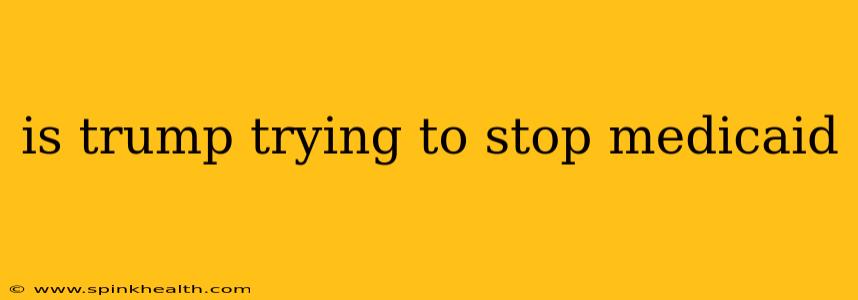Is Trump Trying to Stop Medicaid? Unpacking the Complex Reality
The question of whether Donald Trump aimed to "stop" Medicaid is far more nuanced than a simple yes or no. His administration didn't outright propose abolishing the program, but its actions consistently aimed at significant restructuring and reduction. Understanding this requires looking at the context, the proposed changes, and their potential impact. Let's unravel this complex issue.
My name is Eleanor Vance, and I've spent years researching healthcare policy. My goal here is to provide a balanced and factual overview of the Trump administration's approach to Medicaid.
What were Trump's proposed changes to Medicaid?
The Trump administration's approach to Medicaid wasn't a single, sweeping proposal but rather a series of initiatives aimed at altering its structure and funding. Key strategies included:
-
Block Grants: A core element of the Trump administration's Medicaid strategy was the shift towards block grants. This would have replaced the current system of federal matching funds with a fixed amount of federal funding allocated to each state. This approach sparked intense debate because it would have shifted significant financial responsibility to states, potentially leading to reduced coverage and benefits. States with larger populations needing more Medicaid services would be disproportionately affected.
-
Work Requirements: Several states, with the federal government's approval, implemented work requirements for able-bodied Medicaid recipients. These requirements, strongly supported by the Trump administration, required beneficiaries to work, volunteer, or participate in job training programs to maintain coverage. Critics argued this placed an undue burden on vulnerable populations and created administrative hurdles that could lead to people losing coverage.
-
Per Capita Cap: This controversial approach would have limited the amount of federal funding per Medicaid beneficiary. Critics argued this would have severely limited states' ability to provide necessary care, especially in times of crisis or during public health emergencies.
Did Trump want to eliminate Medicaid entirely?
While the Trump administration never explicitly called for the complete elimination of Medicaid, the proposed changes, if fully implemented, could have had a devastating impact on the program’s scope and effectiveness. The significant reduction in federal funding and the shift in responsibility to states could have resulted in millions losing coverage. The intent may not have been complete elimination, but the consequences could have been very similar.
What were the arguments for and against Trump's Medicaid policies?
Arguments in favor often centered on fiscal responsibility and personal responsibility. Supporters argued that the current Medicaid system was unsustainable and needed reform to control costs. Work requirements were championed as a way to encourage self-sufficiency and reduce dependency on government assistance.
Arguments against highlighted the potential for increased uninsured rates and reduced access to healthcare for vulnerable populations. Critics pointed to the potential for states to cut benefits and services, leading to negative health outcomes. They also stressed the administrative burden and cost of implementing work requirements.
What happened to Trump's Medicaid proposals?
Many of the Trump administration's Medicaid proposals faced significant legal challenges and opposition from states, healthcare providers, and advocacy groups. While some work requirements were implemented in some states, many were blocked by the courts, and the broader block grant and per capita cap proposals did not gain traction.
What is the future of Medicaid?
The future of Medicaid remains a subject of ongoing debate and policy discussions. The Biden administration has taken a different approach, aiming to expand access to healthcare and strengthen the program. However, the challenges of controlling costs and ensuring equitable access continue to be significant hurdles.
The Trump administration's approach to Medicaid was complex and multifaceted. While it didn't aim for outright elimination, the proposed changes had the potential to drastically alter the program, potentially leading to substantial reductions in coverage and access to care. The ultimate impact of those policies is a subject that continues to be analyzed and debated.

